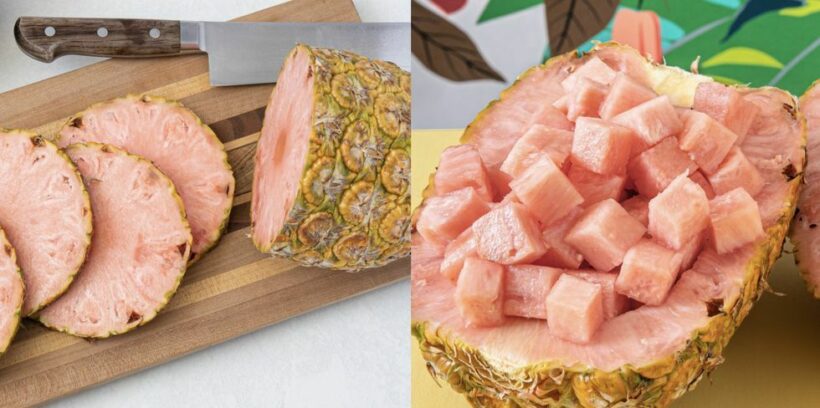Pink pineapple is illegal in Thailand, smugglers face jail time

A type of genetically-modified pink pineapple is being illegally sold in Thailand, according to a warning issued by Thailand’s Ministry of Agriculture yesterday. The ministry urges the public to keep a vigilant eye out for unusual fruit and report anyone involved in the illicit pink pineapple trade.
Costa Rican company Fresh Del Monte has been cultivating ‘Pinkglow’ pineapples, which are allegedly less sour than regular pineapples, since 2005. The ‘Instagrammable’ pineapple became a hit in the US, and is now gaining traction in Thailand.
However, Thailand has a strict GMO-free policy in place, and smuggling Pinkglows into the kingdom is a criminal offence punishable by up to 1 year in prison and/or a fine of up to 20,000 baht. If the authorities uncover a Pinkglow operation, they can immediately seize and destroy the whole lot.
Many people are wary of genetically-modified produce, but the US’s Food and Drug Administration approved consumption of Pinkglows in 2016…
“The new pineapple has been genetically engineered to produce lower levels of the enzymes already in conventional pineapple that convert the pink pigment lycopene to the yellow pigment beta carotene. Lycopene is the pigment that makes tomatoes red and watermelons pink, so it is commonly and safely consumed.”
Pinkglows are reportedly sweeter and juicier than regular pineapples, but are still packed with all the same nutrients, such as Vitamin C which is good for the immune system and manganese which makes bones stronger.
Nevertheless, Pinkglows are a product of genetic manipulation and are illegal in Thailand under the Plant Quarantine Act B.E. 2507. The Ministry of Agriculture says that their manpower is limited, so they urge the public to help in their efforts to stop the illegal Pinkglow trade by reporting anyone selling the outlawed pineapple.
SOURCE: ThaiPBS
Latest Thailand News
Follow The Thaiger on Google News:


























